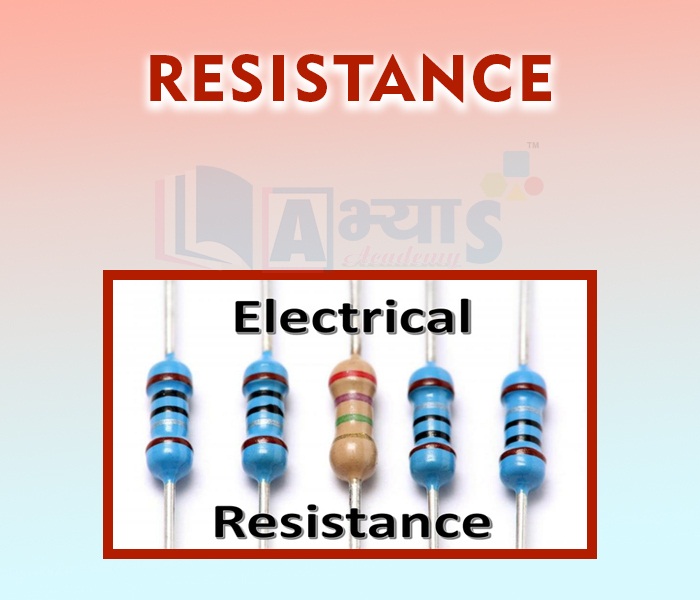Resistance












Resistance
As the electrons move through the thin metal filament of the lamp, they encounter more opposition to motion than they typically would in a thick piece of wire. This opposition to electric current depends on the type of material, its cross-sectional area, and its temperature. It is technically known as resistance.
It is that property of a conductor by virtue of which it opposes/resists the flow of charges through it. The SI unit of resistance is ohm, it is represented by the Greek letter
Resistance is the obstruction offered to the flow of electric current. (It can be said that conductors have low resistance and insulators have very high resistance) This resistance serves to limit the amount of current through the circuit with a given amount of voltage supplied by the battery, as compared with the short circuit where we had nothing but a wire joining one end of the voltage source (battery) to the other.
The S.I. unit of resistance is ohm
The reciprocal of resistance is called conductance G= 1/R
Its S.I. unit is or mho or siemen (s).
Some Important Terms Related to Resistance:
Resistor: The component which the offers resistance to the flow of electrons in an electric circuit is known as resistor. Resistors are used to make those electrical devices, where high resistance is required. It reduces current in a circuit, e.g. alloys like nichrome, manganin and constantan.
Rheostat or Variable resistance It is a variable resistor,which is used to control the flow of electric current by manually increasing or decreasing the resistance
Good conductor A material which offers less resistance to the flow of electrons or electric current in an electric circuit is known as a good conductor, e silver, copper, aluminium are good conductors, among these, silver is the best conductor of electricity.
Poor conductor A material which offers higher resistance to the flow of electrons or electric current in an electric circuit is known as poor conductor, e.g. mercury, lead, stainless steel, alloys of iron and chromium are poor conductors.
Insulator A material which offers very high resistance to the flow of electrons or electric current in an electric circuit is known as insulator, e.g. rubber, dry wood and plastic are insulators. Electric current does not flow through an insulator.
If the length of a wire is doubled and its cross-section is also doubled,then the resistance will- | |||
| Right Option : D | |||
| View Explanation | |||
If a wire is stretched to make its length three times, its resistance will become - | |||
| Right Option : C | |||
| View Explanation |
An electric iron draws a current 4 A when connected to a 220V mains. Its resistance must be | |||
| Right Option : B | |||
| View Explanation | |||
Students / Parents Reviews [10]
One of the best institutes to develope a child interest in studies.Provides SST and English knowledge also unlike other institutes. Teachers are co operative and friendly online tests andPPT develope practical knowledge also.

Aman Kumar Shrivastava
10thA marvelous experience with Abhyas. I am glad to share that my ward has achieved more than enough at the Ambala ABHYAS centre. Years have passed on and more and more he has gained. May the centre flourish and develop day by day by the grace of God.

Archit Segal
7thBeing a parent, I saw my daughter improvement in her studies by seeing a good result in all day to day compititive exam TMO, NSO, IEO etc and as well as studies. I have got a fruitful result from my daughter.

Prisha Gupta
8thI have spent a wonderful time in Abhyas academy. It has made my reasoning more apt, English more stronger and Maths an interesting subject for me. It has given me a habbit of self studying

Yatharthi Sharma
10thAbhyas is a complete education Institute. Here extreme care is taken by teacher with the help of regular exam. Extra classes also conducted by the institute, if the student is weak.

Om Umang
10thIt was good as the experience because as we had come here we had been improved in a such envirnment created here.Extra is taught which is beneficial for future.

Eshan Arora
8thAbout Abhyas metholodology the teachers are very nice and hardworking toward students.The Centre Head Mrs Anu Sethi is also a brilliant teacher.Abhyas has taught me how to overcome problems and has always taken my doubts and suppoeted me.

Shreya Shrivastava
8thMy experience with Abhyas is very good. I have learnt many things here like vedic maths and reasoning also. Teachers here first take our doubts and then there are assignments to verify our weak points.

Shivam Rana
7thMy experience was very good with Abhyas academy. I am studying here from 6th class and I am satisfied by its results in my life. I improved a lot here ahead of school syllabus.

Ayan Ghosh
8thIt was a good experience with Abhyas Academy. I even faced problems in starting but slowly and steadily overcomed. Especially reasoning classes helped me a lot.
